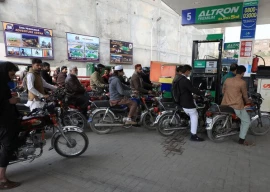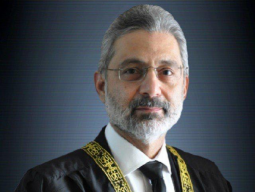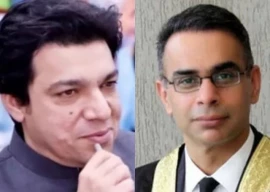-(1)1684400521-0/Untitled-design-(2)-(1)1684400521-0.png)
In a recent interview with BBC Urdu, renowned supermodel Vaneeza Ahmed shared her thoughts on her role in the Pakistani drama series Kuch Ankahi, in which she plays Sofia Agha, and the impact it has had on breaking stereotypes in the industry. Ahmed, known for her successful modelling career, made a comeback to acting with this project after a hiatus.
When asked about her role as a supporting character that became pivotal for the audiences, Ahmed expressed her belief that every role, regardless of its prominence, is essential. "The response has been great. I've never looked at roles in terms of supporting roles or main roles. If you look at older shows - take Tanhaiyan or Ankahi for instance - there is no such thing as a supporting role. We've created this for award functions. Every role is an important role."
She further stated, "The good thing about Kuch Ankahi is that one can see routine stories - and each person is the main lead in their own story. This is what real life is."
Despite the challenges of balancing acting with her responsibilities as a mother of two, Ahmed revealed that she was convinced to take on the role after reading the script. Nadeem Baig, the director of Kuch Ankahi, assured her that she would have fun and encouraged her to make time for the show.
Ahmed acknowledged the difficulties in adjusting her habits to return to acting, but the character of Sofia intrigued her and inspired her to take on the challenge. "It was very hard to come back to acting. My habit had changed, and I have two kids. It did rake a little convincing, but not too much of it. When I read the script I thought, 'Yes, I will definitely do this.' The character was such that I wanted to do it."
She continued, "The time that it takes to do dramas, I didn't have it. But Nadeem said I'd have fun, that I should make time, and that it was time for me to do such a show."
When asked about the similarities between her personality and the strong character Sofia, Ahmed admitted that there were resemblances but pointed out that Sofia is more unapologetic than she is. "It's quite close. She's more unapologetic than I am. Sometimes, I would say, 'How can I say this to my brother or sister-in-law?' But it wasn't me saying it. It was Sofia. It's something I aspire to be, and I think every woman should be like this. Why do we forget ourselves under the guise of shyness? Recognize who you are and don't be apologetic about it."
Ahmed also addressed the stereotype associated with paternal aunts, often portrayed as villains in Pakistani dramas. She humorously mentioned that she shares some traits with her character, as she is a paternal aunt in real life as well. "This is because I am such a paternal aunt in real life too," stated Ahmad with a laugh. "My paternal aunt is also very nice. There are aunts and people like me. If a paternal aunt is saying something, we perceive it to be negative,"
Ahmed advocated for breaking stereotypes, expressing her disapproval of highlighting negativity in dramas. She emphasized the need to showcase positive aspects, such as good paternal aunts, and hopes that Kuch Ankahi plays a role in challenging and changing these stereotypes. "I hope Kuch Ankahi breaks many stereotypes," stated the model. "But why do we show negativity? I am against that. This is why I haven't done so many dramas. We highlight the wrong things. Why don't speak about the good - like good paternal aunts?"
One of the issues highlighted in Kuch Ankahi is the plight of women in Pakistani society, particularly regarding marriage customs and the suppression of their rights. Ahmed passionately discussed the viral marriage scene in which Sofia advocates for reevaluating the nikkahnama, the marriage contract, to benefit women.
She pointed out that many women are unaware of their rights and are taught that they do not deserve them. Ahmed shared her personal experience of feeling unheard during her own marriage contract negotiations, expressing her dismay at the lack of consideration for her rights. She stressed the importance of speaking up and urged women not to be afraid.
"These are issues," said Ahmed. "Our women are suppressed so much that they aren't aware of their rights. We are taught that we do not deserve rights because we are women. But what is wrong - like dowry, or when society takes away the right of divorce, with clerics cutting them out - it's exactly the way it is."
Recalling her own case, Ahmed said, "I remember when I was getting married, no one wanted to talk about it and my mother kept PKR24 as my haq mehr (payment to the bride). Aghast, she continued, "I fought with her later and she said, mine was the same. I said, 'That was fifty years ago!' What is PKR24 in today's world? And you didn't think about your daughter at all? A person like me could not speak up at the time of her marriage contract - the other poor women don't speak at all. It is important to say something. Women should not be afraid."
Highlighting the irony when it comes to being firm, Ahmed said, "Sajal's character is very headstrong - why is that a bad word? She knows what she wants. When a man does it, it is ambitious, when a woman does it, she's shrewd."
Ahmed also commented on the portrayal of older character roles and love stories in Pakistani dramas. "Stories no longer solely revolve around young people globally. Meryl Streep will still play the lead. Emma Thompson will still play the lead. Stories are for everyone. An older person has their own story. Amitabh Bachchan is still playing lead roles. Look at Javed Sheikh or Bushra Ansari. Samina Ahmed got married late. What a beautiful love story. Why not?"
In the interview, Ahmed also touched upon the influence of social media on the entertainment industry. "I don't take pictures and I've gotten in trouble for it. My generation doesn't do this. Our habits are ruined. I didn't have a manager when I was working. I had a lot of work but I didn't have a manager - I was managing myself. It is important now. I'm learning because, for work, social media is important. Because it's another tool. The future is this. Who sits and watches TV? Everyone tunes in to social media."
Ahmed also spoke about finding balance in her life, acknowledging that it has not been an easy journey. "It's not easy. I've only found this balance now. I used to prioritise work. I got married late, and when my kids were born, I left work. I realized that work will never end. I lost my sister, who was only 25 years old. I regretted it so much that I could not spend as much time with her in her last few years as I should have. Now I treat every day as if it is my last. Family first."
As the interview concluded, it became evident that Ahmed's involvement in Kuch Ankahi goes beyond her portrayal of the character Sofia. She is passionate about addressing societal issues, breaking stereotypes, and promoting women's rights. Through her role and the impact of the drama series, Ahmed aims to create a positive change in Pakistani dramas, focusing on highlighting the good and empowering women.
Kuch Ankahi has garnered significant attention and praise from audiences for its compelling storytelling and portrayal of diverse characters. Ahmed's insights into her role and the issues addressed in the series shed light on the thoughtfulness behind the production and the intention to challenge norms and create a more inclusive and progressive narrative.
Have something to add? Share it in the comments below


















1715933857-0/172ndLede-(1)1715933857-0-270x192.webp)




1715843823-0/WhatsApp-Image-2024-05-16-at-12-14-16-(1)1715843823-0-270x192.webp)









COMMENTS
Comments are moderated and generally will be posted if they are on-topic and not abusive.
For more information, please see our Comments FAQ